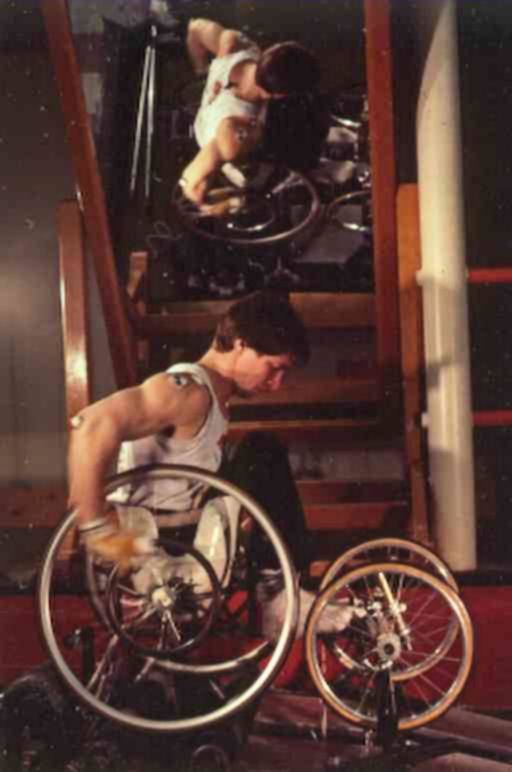
In March of 1985, paralympian and disability activist Rick Hansen set out from Vancouver, British Columbia to circle the globe in his wheelchair. Covering nearly 25,000 miles during his “Man in Motion” tour, Hansen raised $26 million for spinal cord research while changing fundamental perceptions about disability and the need for a more accessible world. Inspired by his story of triumph over adversity, songwriters David Foster and John Parr commemorated his journey home across Canada with the lyrics to “St. Elmo’s Fire (Man in Motion),” a song later made famous by a movie of the same name.
Since my diagnosis with Asperger’s Syndrome in 2013, I’ve struggled with using the term disability to describe myself. It’s at times felt disingenuous to do so; certainly I can’t compare my experience to that of Rick Hansen and individuals with a physical disability, or to individuals with severe psychiatric conditions such as schizophrenia. Yet I struggle nonetheless with basic functions of daily living, particularly when it comes to communicating effectively with others. I may not have physical limitations (other than sensory issues) but I do need understanding and reasonable accommodations to find success in many aspects of my life. And such accommodations are based on having a legally-qualified disability.
Gonna be your man in motion, all I need is a pair of wheels. Take me where my future’s lyin’, St. Elmo’s fire…
John Parr “St. Elmo’s Fire”
The ADA defines disability as “a physical or mental impairment that substantially limits one or more major life activity.” There is no question that High Functioning Autism does exactly this. (The Americans with Disabilities Act includes “interacting with others” as a major life activity, along with communication, thinking, and other functions.) But where does this leave me? Is there a “disability spectrum” and if so, where do I fall on it?
The world Rick Hansen traveled in the mid-1980’s was very different with respect to disabilities. The Americans with Disabilities Act was still years away, there were very limited programs to promote accessibility, and people with disabilities enjoyed little in the way of workplace protections. Few people expected a man who lost the use of his legs at age 15 to circumnavigate the planet under his own power. Thirty-four years later, I’d like to say that has all changed–and indeed much has. Yet we have a long way to go in regard to physical as well as mental and psychological conditions.
I can climb the highest mountain, cross the wildest sea. I can see St. Elmo’s fire burnin’ in me, burnin’ in me. Just once in his life a man has his time. And my time is now, I’m coming alive.
John Parr “St. Elmo’s Fire”
Recently I found myself for the first time having to stand up for my legal rights as a person with an Autism Spectrum Disorder. This forced me to at long last acknowledge and own my status as a person with a disability. For more than six years I’ve managed to avoid this fundamental question about disability, floating along in a liminal space somewhere between disabled, differently-abled, and having a different “operating system.” Yet the bottom line is that my brain does work differently from others around me. My ability to communicate and interact with others is impaired by my condition, the very definition of a disability. I do benefit tremendously from reasonable accommodations both at work and at home.
As I grappled with this question of disability, “St. Elmo’s Fire” suddenly spoke to me in new ways (yes, I grew up in the 80’s.) Through Parr’s song, Rick Hansen’s story has helped me see for the first time the bigger picture of living with a disability. Even now, when I’m struggling with the daily challenges of Asperger’s, I find myself closing my eyes for a moment. I see Hansen as he powers his wheel chair across the farms of western Canada; a man in motion, heading toward a new horizon underneath a blazing sky. With his journey Rick Hansen didn’t just overcome his disability; he fundamentally changed how the world understood it.
I can hear the music playin’, I can see the banners fly. Feel like a man again, I’ll hold my head high. Gonna be a man in motion, all I need is a pair of wheels.
John Parr “St. Elmo’s Fire”
So it turns out the issue for me isn’t just whether I have a disability; it’s how the world sees Autism, and how our society defines disability. In standing up for my rights as a person with High Functioning Autism, I’m not just advocating for my own cause. I have the privilege of speaking on behalf of everyone with my condition, and for that matter on behalf of all individuals with disabilities. I own my Autism; it’s who I am and there should be no shame in that for anyone. If being understood and accommodated means acknowledging my disability, then I am proud to do so–and to hell with whatever stigma our society attaches to disability. I believe Rick Hansen would say the same.

Michelle Tuck
Thank you again for sharing. I look forward to your next post.